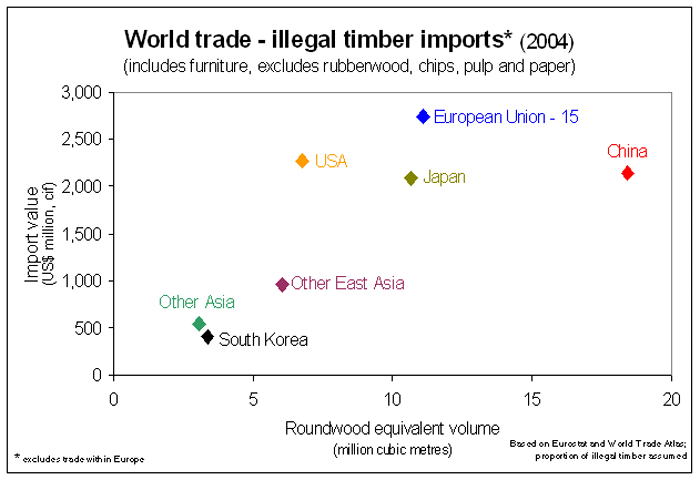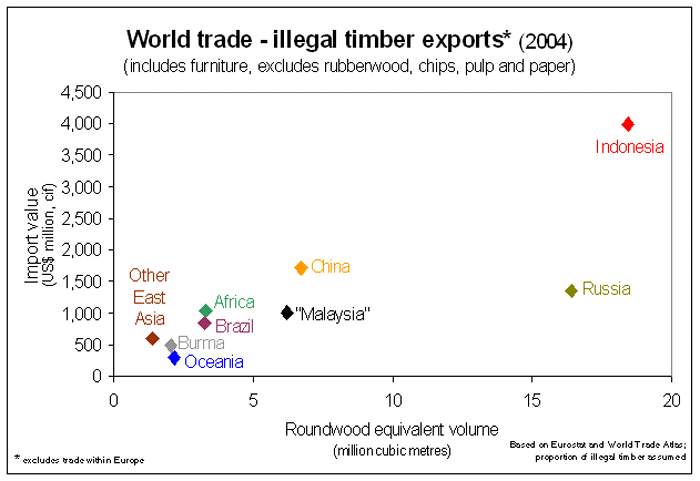|
|
||||||||||||||||||||||||||||||||||||||||||||||||||||||||||||||||||||||||||||||||||||||||||||||||||
|
|
||||||||||||||||||||||||||||||||||||||||||||||||||||||||||||||||||||||||||||||||||||||||||||||||||
|
Illegal Timber |
||||||||||||||||||||||||||||||||||||||||||||||||||||||||||||||||||||||||||||||||||||||||||||||||||
|
Attempts to combat global trade in "illegal timber" risk being largely futile unless they specifically seek to address the bilateral trade flows shown below. Click here for explanatory notes.
|
||||||||||||||||||||||||||||||||||||||||||||||||||||||||||||||||||||||||||||||||||||||||||||||||||
|
Illegal Timber Activities that do not conform to national law but which are connected with the extraction of timber from forest (or plantations) and the subsequent processing and trade in wood-based products render those products illegal. Such activities include the financing and acquisition of mills and concessions - the former might be fraudulent; the entity which allocated the concession might not have had authority to make that allocation; the allocation process might have been corrupt. The profitability of trade in illegal timber grossly inflates apparent demand for timber and fuels unsustainable development. The likelihood of being both convicted and actually obliged to suffer a penalty is generally too low to serve as a disincentive - particularly when compared with the option of corrupting the legal process. Efforts to combat the economic crime component of "illegal timber" should take into account that such crime might well be widespread outside the timber and paper industries, including in countries which do not export large quantities of illegal timber Depending on their remit, Independent Forest Observers can play a valuable, but necessarily temporary, role in assisting host countries address the improper allocation of concessions, illegal logging operations, and tax evasion. However, until they are able too investigate the concessions of the most powerful families in the countries/regions concerned and their associates (including the law enforcement authorities) - and until infractions thus exposed are seen to have been equitably dealt with, their impact will be limited - and the output of those concessions should be considered illegal. "Illegal timber" should only refer to wood-based products whose raison d'être is commerce - it should not refer to timber that has been extracted in order to meet the domestic needs of people living in and native to the forest area concerned Generally, precedence over legality should be given to the sustainability of forest management. The constitution of most countries specifically demands the sustainable management of natural resources. With some commendable exceptions, bi-lateral and multi-lateral initiatives to combat trade in "illegal timber" have been little more than political rhetoric (continuing to favour lack of transparency). Probably the best way forward is to insist that the chain of supply of one's imports is credibly certified (in accordance with the FSC scheme - or equivalent) as legal and from a sustainably managed forest (or plantation). It is likely that powerful vested interests will endeavour to minimise the penetration of such schemes - not least because they fear that such schemes will reduce their private income. However, others and the countries/regions concerned are likely to benefit - both politically and economically. There is an increasing body of evidence to suggest that individual politicians, senior government, military and police officers, and the directors of enterprises (including corporate groups) should be convicted of actively facilitating trade in "illegal timber" - and/or other commodities. Until they are actually convicted, these individuals should have their foreign assets frozen in (and should be refused entry visas by) importing countries (if lawyers outside the country demonstrate a sufficiently compelling case). |
||||||||||||||||||||||||||||||||||||||||||||||||||||||||||||||||||||||||||||||||||||||||||||||||||
|
Copyright
globaltimber.org.uk
|
||||||||||||||||||||||||||||||||||||||||||||||||||||||||||||||||||||||||||||||||||||||||||||||||||


